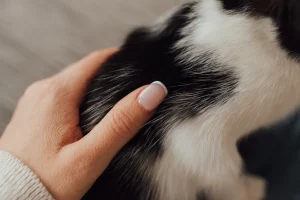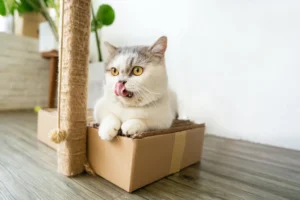Have you noticed your Russian Blue cat shedding more than usual? Wondering why your beloved feline friend is losing hair? It can be concerning to see your cat experiencing hair loss, but understanding the potential reasons behind it can help you address the issue effectively.
Hair Loss in Russian Blue Cats: Common Causes and Solutions
Genetic Factors:
If you’re scratching your head wondering why your Russian Blue cat seems to be shedding more than usual, genetic factors could be at play. This elegant breed is known for certain genetic predispositions that may lead to excessive hair loss. Some Russian Blues may inherit genes that cause them to shed more frequently or in larger quantities than other breeds. While you can’t change your cat’s genetics, you can talk to your veterinarian about potential solutions to help manage their shedding. Regular grooming and a healthy diet can also contribute to keeping your Russian Blue’s coat in top condition.
Stress and Anxiety:
Just like humans, cats can experience stress and anxiety that may impact their overall health, including the condition of their coat. If your Russian Blue is losing hair, consider potential stress triggers in their environment. Changes in routine, loud noises, or even the presence of other pets can all cause stress for your feline friend. To help alleviate stress, create a calm and comfortable space for your cat to relax. Providing plenty of toys, scratching posts, and cozy hiding spots can also help reduce anxiety in your Russian Blue. Remember, a happy and stress-free cat is more likely to have a healthy and luscious coat.
- Additional Insight: One unique way to help reduce stress in Russian Blue cats is by incorporating interactive play sessions into their daily routine. Engaging your cat in play not only provides mental stimulation but also helps them release pent-up energy and stress. Consider using toys that mimic hunting behaviors, such as feather wands or laser pointers, to keep your Russian Blue entertained and content. By making playtime a priority, you can help improve your cat’s overall well-being and potentially reduce hair loss caused by stress.
Dietary Issues:
Maintaining a balanced diet is crucial for your Russian Blue cat’s overall health, including their coat. A lack of essential nutrients can lead to hair loss, so it’s important to ensure they are getting a well-rounded diet rich in proteins, vitamins, and minerals. Consider incorporating high-quality cat foods specifically designed for their breed to ensure they are getting the necessary nutrients for a healthy coat.
Skin Conditions:
Hair loss in Russian Blue cats can also be attributed to various skin conditions. Allergies, infections, and parasites are common culprits that can cause your feline friend to shed excessively. If you notice your cat scratching more than usual or experiencing skin irritations, it’s essential to consult your veterinarian for a proper diagnosis and treatment plan. Regular grooming and flea prevention can also help in maintaining a healthy coat and skin for your Russian Blue cat.
Additional Insight:
Regular grooming can not only help in preventing hair loss due to skin conditions but also promote healthy coat growth. Brushing your Russian Blue cat regularly can help distribute natural oils, remove loose fur, and prevent matting, ultimately contributing to a shiny and full coat. So, make sure to set aside some quality grooming time with your feline friend to keep their coat in top condition.
Grooming Habits:
Russian Blue cats are known for their luxurious coats, but without proper grooming, they can experience excessive shedding. Regular grooming is crucial in maintaining their coat health and preventing hair loss. Brushing your Russian Blue cat at least once a week can help remove loose hair, distribute natural oils, and prevent mats. Use a soft brush or comb specifically designed for short-haired breeds to avoid causing discomfort to your furry friend. Additionally, bathing your cat occasionally can help remove excess hair and dirt, keeping their coat healthy and shiny. Remember, grooming is not only about aesthetics but also plays a vital role in your cat’s overall well-being.
Environmental Factors:
Various environmental factors can impact your Russian Blue cat’s coat health and contribute to hair loss. Temperature fluctuations, humidity levels, and seasonal changes can all play a role in affecting your cat’s coat. Ensure your cat has a comfortable living environment with consistent temperature and proper ventilation to prevent stress-induced shedding. During seasonal changes, pay extra attention to your cat’s grooming routine to accommodate their coat’s needs. Providing a balanced diet, regular exercise, and a stress-free environment can also help maintain a healthy coat for your Russian Blue cat.
Additional Unique Insight:
Did you know that stress can also impact your Russian Blue cat’s coat health? Cats are sensitive to changes in their environment, and stress or anxiety can manifest in various ways, including excessive shedding. To help your furry companion cope with stress, ensure they have a safe and comfortable space, plenty of playtime, and positive interactions with you. By reducing stress levels, you can help prevent hair loss in your Russian Blue cat.
Veterinary Care:
Regular veterinary check-ups are essential for monitoring your Russian Blue cat’s overall health and tackling any underlying medical issues that could be causing their hair loss. Remember, your vet is your cat’s best friend when it comes to identifying and addressing health concerns early on.
Fun Fact: Russian Blue cats boast a stunning silver-blue coat that requires consistent grooming to keep it looking its best. Regular brushing not only helps maintain their shimmering appearance but also aids in preventing excessive shedding that may be linked to hair loss issues.
By staying proactive and keeping up with your cat’s veterinary care, you can ensure that their coat remains healthy and vibrant. If you notice any changes in your Russian Blue’s hair or skin condition, don’t hesitate to reach out to your veterinarian for personalized guidance and support.
Dietary Considerations:
In addition to veterinary check-ups, your Russian Blue’s diet plays a crucial role in maintaining a healthy coat. Ensure they are receiving a balanced diet rich in essential nutrients like protein, omega-3 fatty acids, and vitamins necessary for promoting skin and coat health. Incorporating a high-quality cat food specifically formulated for skin and coat health can make a significant difference in reducing hair loss and promoting a glossy coat.
Pro Tip: Consider adding a nutrient-rich supplement recommended by your vet to further support your Russian Blue’s coat health. Omega-3 fatty acids are particularly beneficial for skin and coat health and can help reduce shedding and promote a shiny coat. Just remember to consult your veterinarian before making any significant changes to your cat’s diet or supplement routine.
Alex, a passionate animal lover, has experience in training and understanding animal behavior. As a proud pet parent to two dogs and three cats, he founded AnimalReport.net to share insights from animal experts and expand his knowledge of the animal kingdom.









